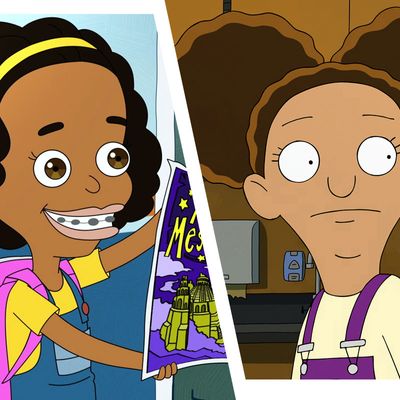
On Wednesday, two animated comedies announced significant changes in their casts. Jenny Slate, who voices a biracial teen named Missy in Netflix’s puberty comedy Big Mouth, explained that she would no longer play that role. “At the start of the show, I reasoned with myself that it was permissible for me to play ‘Missy’ because her mom is Jewish and White — as am I. But ‘Missy’ is also Black, and Black characters on an animated show should be played by Black people,” she wrote in an Instagram post. A few hours later, the Apple TV+ series Central Park, currently in its first season, announced that Kristen Bell would no longer be the voice actor for Molly, also a biracial character. “This is a time to acknowledge our acts of complicity. Here’s 1 of mine,” Bell tweeted. Portraying Molly “shows a lack of awareness of my pervasive privilege,” she wrote. “Casting a mixed race character w/ a white actress undermines the specificity of the mixed race & Black American experience.”
What these decisions should clarify for creators and performers is that there’s a lie buried inside the fundamental excuse for why these changes typically don’t happen. The idea has always been that it is too hard: It’s hard to do color-conscious casting in the first place, and it’s hard to take a character who already exists and change them after the fact. Pushed on casting Bell in the role of Molly back in January, Central Park creator Loren Bouchard made it sound like it was impossible to make the show without Bell’s involvement. “Kristen needed to be Molly,” he said. “We couldn’t not make her Molly.” (Bouchard apologized for that “non-explanation” yesterday.) What Big Mouth and Central Park tell us is that’s just not the case, and fixing these casting errors is actually very simple.
It’s true that both shows have more work to do now. Slate’s and Bell’s roles will need to be recast. Their contracts will need to be unraveled. New actors will need to be auditioned and hired. It will likely be expensive, and it may take time to find the right people to fill those roles. But recasting animated voices is no harder than any other part of making a TV show. Actors leave roles all the time for all kinds of reasons, and roles regularly need to be recast or written out of shows. (The longtime puppeteer for Kermit the Frog was let go in 2017, for instance, but Kermit will live on in a new Muppet series this summer.) Contracts are renegotiated; situations change. Making this kind of move is not an extraordinary feat. It’s the day-to-day operations of Hollywood.
It’s always hard to make something, or to remake it. But it’s notable that the hard work here will come in the remaking stage, not in the unmaking. It will take work to fix characters who were already created and cast, to find new performers, and to rewrite the roles in a way that addresses the shows’ original blind spots. The act itself, though — withdrawing from a role as Jenny Slate did, or coming to a mutual agreement as seems to have been the case for Central Park — is astonishingly easy. These announcements are striking examples of performative speech, a kind of utterance that is both word and action all at once: The act of undoing these color-blind casting decisions is as simple as announcing that those actors will no longer participate. The declaration is the deed. And in these cases, the most important first step is the unmaking, the acknowledgment that the shows’ creators and producers were wrong and will now commit to make different choices going forward. The most significant part is also the easiest to do. The people who make these shows decide to change, and then they say it. It’s elementary.
In animation especially, the Big Mouth and Central Park announcements are the latest in a growing wave of discussion about color-conscious voice casting, and there’s reason to hope that the industry’s widespread acceptance of color-blind casting has started to shift. BoJack Horseman creator Raphael Bob-Waksberg has had public discussions about his changing position on casting Alison Brie as the voice of Diane Nguyen, a Vietnamese-American character. (“We should have hired a Vietnamese writer and a Vietnamese actor to play Diane,” he recently tweeted.) In February, The Simpsons announced that white actor Hank Azaria would no longer be the voice of Indian character Apu. But it took a long time for these enormous blind spots and mistakes to get acknowledged, much less rectified. Comedian Hari Kondabolu first began criticizing Azaria’s role as the voice of Apu in 2012 and made an entire documentary about the issue in 2017; The Simpsons hasn’t yet revealed if Apu will be recast or written off the show. BoJack’s Diane Ngyuen was never recast over the show’s six seasons, even after Bob-Waksberg admitted he recognized the problem in 2018, when the show was still in production. The changes in Big Mouth and Central Park demonstrate how paltry those admissions were, though, and why it’s important that the timeline is shrinking. Big Mouth will have a new Missy when the show begins production on its fifth season, and Central Park’s decision comes in the middle of airing its first season. Real change means committing to undo a show’s status quo, even if it feels awkward.
The simplest and most effective solution is to not accept the excuse of color-blind casting in the first place. If these characters had all been cast with color-conscious decisions from day one, these demonstrations of ignorance and privilege would never have been part of the shows’ histories. Short of that, though, these announcements should be a lesson to other creators and performers alike. It may seem hard to make casting changes, but it’s utterly straightforward. All it takes is for the people responsible to have the guts to say the thing out loud.


